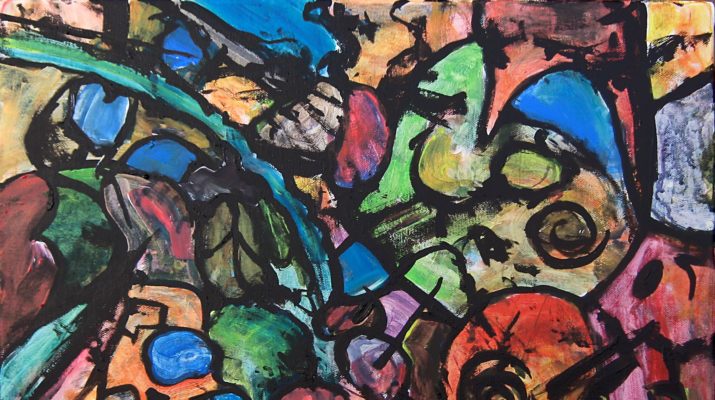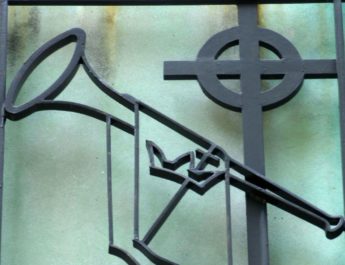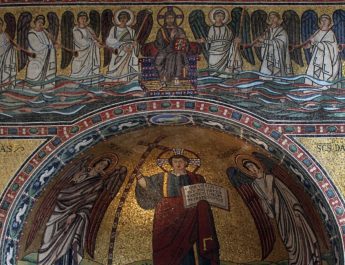Psalm 118
BibleHub
1 O give thanksI to the Lord,II for he is good;III
his steadfast loveIV endures forever!V
Notes on verse 1
I “give thanks” = yadah. From yad (hand). This is to throw one’s hands into the air in a gesture of praise. So, it is to praise, give thanks, or make a confession.
II “Lord” = YHVH. From havah (to be, become) or hayah (to come to pass, become, be). This is the name of the God of Israel, the self-existent and eternal one, the tetragrammaton. This pronunciation has been lost to time so “Lord” is generally used in its place.
III “good” = tob. From tob (to be pleasing, to be good). This is good, beautiful, pleasant, agreeable, bountiful, at ease. This word is used for goodness as a concept, a good thing, a good person. This can refer to prosperity and welfare as well as joy, kindness, sweetness, and graciousness. So, this is ethically good, but also enjoyably good.
IV “steadfast love” = chesed. From chasad (being good, kind, merciful; may mean bowing one’s neck as is done in the presence of an equal for courtesy’s sake; so, if one in a superior position is treating you like an equal, that is what is captured here). This is favor, goodness, kindness, loving kindness, pity, reproach, or a good deed. When done by God to humanity, this is mercy/loving kindness. When done by humanity to God, it is piety.
V “forever” = olam. This is a long scope of time whether in the past (antiquity, ancient time) or in the future (eternal, everlasting).
2 Let IsraelVI say,VII
“His steadfast love endures forever.”
3 Let the houseVIII of AaronIX say,X
“His steadfast love endures forever.”
4 Let those who fearXI the Lord say,XII
“His steadfast love endures forever.”
Notes on verses 2-4
VI “Israel” = Yisrael. From sarah (to persist, exert oneself, contend, persevere, wrestle, prevail) + el (God or god). This is Israel, meaning God strives or one who strives with God; new name for Jacob and for his offspring. This refers to the people and to the land.
VII {untranslated} = na. This particle is used for requests or for urging. It can be we pray, now, I ask you, oh. This is the same “na” in “hosanna.”
VIII “house” = bayit. Probably from banah (to build, make, set up, obtain children; to build literally or figuratively). This is house, court, family, palace, temple.
IX “Aaron” = Aharon. Derivation uncertain. May mean “bearer of martyrs” OR be related to Ancient Egyptian ꜥḥꜣ rw (warrior lion) OR elevated, exalted, high mountain. This is Aaron. See https://en.wiktionary.org/wiki/Aaron
X {untranslated} = na. Same as {untranslated} in v2. See note VII above.
XI “fear” = yare. From the same as yare (to fear, be afraid, dreadful; also fearful reverence – to fear in a moral sense is to say to revere, respect). This is fearful or morally reverent.
XII {untranslated} = na. Same as {untranslated} in v2. See note VII above.
5 Out of my distressXIII I called onXIV the Lord;XV
the LordXVI answeredXVII me and set me in a broad place.XVIII
Notes on verse 5
XIII “distress” = metsar. 3x in OT– 2x in the Psalms & 1x in Lamentations. From tsarar (to bind, restrict, narrow, be cramped, an adversary). This is something tight. Figuratively, it is used for distress, pain, or trouble.
XIV “called on” = qara. This is to call or call out – to call someone by name. Also used more broadly for calling forth.
XV “Lord” = Yah. Related to “Lord” in v1. From YHVH (see note II above). This is Lord or God – a shortened form of God’s most holy name.
XVI “Lord” = Yah. Same as “Lord” in v5. See note XV above.
XVII “answered” = anah. This is answer, respond, announce, sing, shout, or testify. It means to pay attention, which implies responding and, by extension, starting to talk. Used in a specific sense for singing, shouting, testifying, etc.
XVIII “broad place” = merchab. 6x in OT. From rachab (to grow wide or enlarge in a literal or figurative sense; extend, relieve, rejoice, or speak boldly). This is a broad place, a large field, an open space. This is a wide open space, generally in a good sense. Figuratively, it can mean liberty.
6 With the LordXIX on my side I do not fear.XX
What can mortalsXXI doXXII to me?
7 The LordXXIII is on my side to helpXXIV me;
I shall look in triumphXXV on those who hateXXVI me.
Notes on verses 6-7
XIX “Lord” = YHVH. Same as “Lord” in v1. See note II above.
XX “fear” = yare. Related to “fear” in v4. See note XI above.
XXI “mortals” = adam. Perhaps from adam (to be red, make ruddy); related to adamah (ground, dirt, earth). This is man, humankind, also Adam’s name. It refers to a human individual or humanity.
XXII “do” = asah. This is to make, do, act, appoint, become in many senses.
XXIII “Lord” = YHVH. Same as “Lord” in v1. See note II above.
XXIV “help” = azar. This is to surround, which implies encircling to protect someone or help them out. It can also be help, ally, or support.
XXV “look in triumph” = raah. This is to see in a literal or figurative sense so stare, advise, think, view.
XXVI “hate” = sane. This is to hate, an enemy. It is a personal hatred and not an abstract one.
8 It is betterXXVII to take refugeXXVIII in the LordXXIX
than to put confidenceXXX in mortals.
9 It is better to take refuge in the LordXXXI
than to put confidence in princes.XXXII
Notes on verses 8-9
XXVII “better” = tob. Same as “good” in v1. See note III above.
XXVIII “take refuge” = chasah. This is to take refuge or flee for protection. Figuratively, it means to hope or trust in someone or something.
XXIX “Lord” = YHVH. Same as “Lord” in v1. See note II above.
XXX “put confidence” = batach. This is to hide for refuge, be secure or sure. Figuratively, it refers to trust, being confident, or hoping.
XXXI “Lord” = YHVH. Same as “Lord” in v1. See note II above.
XXXII “princes” = nadib. From nadab (to offer willingly, volunteer, freely give, be willing). Properly, this is voluntary and so it implies generous, noble, magnanimous, or a generous person.
10 AllXXXIII nationsXXXIV surroundedXXXV me;
in the nameXXXVI of the LordXXXVII I cut them off!XXXVIII
11 They surrounded me, surrounded me on every side;
in the name of the LordXXXIX I cut them off!
Notes on verses 10-11
XXXIII “all” = kol. From kalal (to complete). This is all or every.
XXXIV “nations” = goy. From the same root as gevah (the back, person, or body); related to gev (among); related to gaah (to rise up). This is nation or people. Often used to refer to Gentiles or foreign nations. It can also be used figuratively for a group of animals. This is where the Yiddish “goy” comes from.
XXXV “surrounded” = sabab. This is turning around, going around; to surround, cast, walk, fetch. It is to revolve or border in a literal or figurative sense.
XXXVI “name” = shem. May be from sum (to put, place, set). This is name, fame, renown. A name was thought to indicate something essential about a person – something about their individuality. So, this word can also mean honor, authority, or character.
XXXVII “Lord” = YHVH. Same as “Lord” in v1. See note II above.
XXXVIII “cut…off” = mul. This is to cut off, cut in pieces, or destroy. It is used for to circumcise. It can also mean to blunt.
XXXIX “Lord” = YHVH. Same as “Lord” in v1. See note II above.
12 They surrounded me like bees;XL
they blazedXLI like a fireXLII of thorns;XLIII
in the name of the LordXLIV I cut them off!
Notes on verse 12
XL “bees” = deborah. 4x in OT. From dabar (to speak, declare, discuss). This is a bee.
XLI “blazed” = daak. 9x in OT. This is to go out, quench, dry up.
XLII “fire” = esh. This is fire, burning, flaming, hot. It is fire in a literal or figurative sense.
XLIII “thorns” = qots. 12x in OT. Perhaps from quts (summer, clip off); from qayits (fruit, harvest, dry season). This is a thorn or thornbush.
XLIV “Lord” = YHVH. Same as “Lord” in v1. See note II above.
13 I was pushed hard,XLV so that I was falling,XLVI
but the LordXLVII helped me.
Notes on verse 13
XLV “pushed hard” = dachah + dachah. 11x in OT. This is to push down, drive, thrust, totter, trip, or chase. It can also mean to overthrow or refer to an outcast as one has been pushed down/overthrown. The word is repeated twice – the first time as an Infinitive Absolute. The Infinitive Absolute serves to emphasize the sentiment of the word. It is rather like Foghorn Leghorn’s speech pattern, “I said, I said.”
XLVI “falling” = naphal. This is to fall, whether by accident, to fall prostrate, or to fall in violent death. Figuratively, it can refer to personal ruin or calamity, a city falling, an attack or a falling away. It can also be a deep sleep or wasting away.
XLVII “Lord” = YHVH. Same as “Lord” in v1. See note II above.
14 The LordXLVIII is my strengthXLIX and my might;L
he has becomeLI my salvation.LII
Notes on verse 14
XLVIII “Lord” = Yah. Same as “Lord” in v5. See note XV above.
XLIX “strength” = oz. From azaz (to be strong, become fixed, be bold, prevail, be impudent; it means to be stout literally or figuratively. A Late Hebrew word). This is strength in the sense of force, majesty, praise, material and physical strength, the abstract notion of security. It can also speak of social or political power.
L “might” = zimrath. 3x in OT. From the same as zimrah (melody, psalm, or sound; sung to praise God or a song sung with an instrument); from zamar (making music; used specially of music to worship God; music with singing, singing praise, singing psalms); may be from zamar (to trim or prune). This is a song or instrumental music. It implies a song of praise.
LI “become” = hayah. Related to “Lord” in v1 & “Lord” in v5. See note II above.
LII “salvation” = yeshuah. From yasha (to deliver, defend, help, preserve, rescue, be safe. Properly, to be open, wide or free, which implies being safe. Used causatively, it means to free). This is salvation, deliverance, health, victory, prosperity.
15 There are glad songsLIII of victoryLIV in the tentsLV of the righteous:LVI
Notes on verse 15a
LIII “glad songs” = qol + rinnah. Qol is a sound, used often for human voices. Also used when God speaks or angels, animals or instruments. It can be a cry or a noise, thunder or earthquakes and so on. Rinnah is from ranan (a cry of joy or a joyful song; properly, emitting a shrill sound, especially one of joy). This is a song, shout, cry of joy, or proclamation. It could also be a shout of grief.
LIV “victory” = yeshuah. Same as “salvation” in v14. See note LII above.
LV “tents” = ohel. Perhaps from ahal (to shine, be clear). This is a tent, covering, home, or side pillar.
LVI “righteous” = tsaddiq. From the same as tsedeq (rightness, righteousness, just cause, vindication; that which is right in a natural, moral, or legal sense; abstractly equity; figuratively prosperity). This is just, innocent, righteous, righteous one, or lawful.
“The right handLVII of the LordLVIII does valiantly;LIX
16 the right hand of the LordLX is exalted;LXI
the right hand of the LordLXII does valiantly.”
Notes on verses 15b-16
LVII “right hand” = yamin. May be from yamam (to go or choose the right, use the right hand; to be physically fit or firm). This can mean right hand, right side, or south. Since most people are right-handed, the metaphorical usage of this word presumes that the right hand is stronger and more agile. Thus, it is the instrument of power and action.
LVIII “Lord” = YHVH. Same as “Lord” in v1. See note II above.
LIX “valiantly” = chayil. From chul (to be firm, strong, prosperous; to endure). This is strength, wealth, ability, activity. It can refer to soldier or a company of soldiers as well as goods. It is a force of people, means, or goods. It can speak of valor, virtue, or strength.
LX “Lord” = YHVH. Same as “Lord” in v1. See note II above.
LXI “is exalted” = ramam. 7x in OT. This is to rise in a literal or figurative sense. So, it can be to get up or exalt.
LXII “Lord” = YHVH. Same as “Lord” in v1. See note II above.
17 I shall not die,LXIII but I shall live,LXIV
and recountLXV the deedsLXVI of the Lord.LXVII
Notes on verse 17
LXIII “die” = mut. This is to die in a literal or figurative sense. It can also refer to being a dead body.
LXIV “live” = chayah. This is to live or keep alive in a literal or figurative sense. So, it can be revive, nourish, or save.
LXV “recount” = saphar. From sepher (writing, document, book, evidence). This is properly to tally or record something. It can be enumerate, recount, number, celebrate, or declare.
LXVI “deeds” = maaseh. Related to “do” in v6. From asah (see note XXII above). This is a word – any action whether positive or negative. It can also be a transaction, construction, activity, property, or something that is produced.
LXVII “Lord” = Yah. Same as “Lord” in v5. See note XV above.
18 The LordLXVIII has punished me severely,LXIX
but he did not give me overLXX to death.LXXI
Notes on verse 18
LXVIII “Lord” = Yah. Same as “Lord” in v5. See note XV above.
LXIX “punished…severely” = yasar + yasar. This is to discipline, correct, train, teach, punish. Literally, it is disciplining with blows, but figuratively using words. The word is repeated twice – the first time as an Infinitive Absolute. The Infinitive Absolute serves to emphasize the sentiment of the word. It is rather like Foghorn Leghorn’s speech pattern, “I said, I said.”
LXX “give…over” = natan. This is to give, put, set, offer. It is to give literally or figuratively.
LXXI “death” = mavet. Related to “die” in v17. From mut (see note LXIII above). This can be death, deadliness, the dead, or the place where the dead go. It can be used figuratively for pestilence or ruin.
19 OpenLXXII to me the gatesLXXIII of righteousness,LXXIV
that I may enterLXXV through them
and give thanks to the Lord.LXXVI
Notes on verse 19
LXXII “open” = patach. This is to open wide in a literal or figurative sense. So, it is open, draw out, let something go free, break forth. It can also mean to plow, engrave, or carve.
LXXIII “gates” = shaar. May be related to sha’ar (to calculate or reckon; may come from a root that means to open up or split). This is a gate, door, or other opening like a port.
LXXIV “righteousness” = tsedeq. Related to “righteous” in v15. See note LVI above.
LXXV “enter” = bo. This is to enter, come in, advance, fulfill, bring offerings, enter to worship, attack. It can also have a sexual connotation.
LXXVI “Lord” = Yah. Same as “Lord” in v5. See note XV above.
20 This is the gate of the Lord;LXXVII
the righteous shall enter through it.
21 I thank you that you have answered me
and have become my salvation.
22 The stoneLXXVIII that the buildersLXXIX rejectedLXXX
has become the chiefLXXXI cornerstone.LXXXII
Notes on verses 20-22
LXXVII “Lord” = YHVH. Same as “Lord” in v1. See note II above.
LXXVIII “stone” = eben. This is a stone, weight, or mason. It is part of the word “Ebenezer.”
LXXIX “builders” = banah. Related to “house” in v3. See note VIII above.
LXXX “rejected” = ma’as. This is to reject, refuse, despise, disdain, reject, or spurn. It can also be to disappear or melt away.
LXXXI “chief” = rosh. This may come a word that means to shake. It is the head, captain, or chief. It can also be excellent or the forefront. It can be first in position or in statue or in time (i.e. the beginning).
LXXXII “cornerstone” = pinnah. Perhaps from pen (corner, angle, street, wall). This is an angle, corner, cornerstone, tower, bulwark, pinnacle. Figuratively, it can be a chieftain.
23 This isLXXXIII the Lord’sLXXXIV doing;
it is marvelousLXXXV in our eyes.LXXXVI
Notes on verse 23
LXXXIII “is” = hayah. Same as “become” in v14. See note LI above.
LXXXIV “Lord’s” = YHVH. Same as “Lord” in v1. See note II above.
LXXXV “marvelous” = pala. From pele (wonder, miracle, wonderful, marvelous thing). This is to be extraordinary, to arise, to be great or accomplish.
LXXXVI “eyes” = ayin. This is eye in a literal or figurative sense so eye, appearance, favor, or a fountain (the eye of the landscape).
24 This is the dayLXXXVII that the LordLXXXVIII has made;LXXXIX
let us rejoiceXC and be gladXCI in it.
Notes on verse 24
LXXXVII “day” = yom. Root may mean being hot. This is the day in a literal or figurative sense. It can also mean birth, age, daylight, continually or other references to time.
LXXXVIII “Lord” = YHVH. Same as “Lord” in v1. See note II above.
LXXXIX “made” = asah. Same as “do” in v6. See note XXII above.
XC “rejoice” = gil. Properly, this is twirling around because of a strong feeling whether of rejoicing or from fear. This can be rejoice, be glad or joyful, or to cry.
XCI “be glad” = samach. This is to rejoice or be glad. Properly, it is to brighten up in a literal or figurative sense.
25 SaveXCII us,XCIII we beseechXCIV you, O Lord!XCV
O Lord,XCVI we beseech you, give us success!XCVII, XCVIII
Notes on verse 25
XCII “save” = yasha. Related to “salvation” in v14. See note LII above.
XCIII {untranslated} = na. Same as {untranslated} in v2. See note VII above.
XCIV “beseech” = annah. Related to {untranslated} in v2. 13x in OT– 4x for beg, beseech, entreat; 9x for Alas, O, Ah. Perhaps from ahabah (love); {from aheb (to love, beloved, friend; to have affection for sexually or otherwise)} + na (see note VII above). This word is oh, I ask you, now.
XCV “Lord” = YHVH. Same as “Lord” in v1. See note II above.
XCVI “Lord” = YHVH. Same as “Lord” in v1. See note II above.
XCVII “give…success” = tsalach. This is pushing forward in a literal or figurative sense. So it could be to break out, to come mightily, to rush, to go over. Figuratively, it could mean to prosper.
XCVIII {untranslated} = na. Same as {untranslated} in v2. See note VII above.
26 Blessed isXCIX the one who comesC in the name of the Lord.CI
We bless you from the house of the Lord.CII
27 The LordCIII is God,CIV
and he has given us light.CV
Notes on verses 26-27a
XCIX “blessed is” = barak. This is to kneel, to bless. It is blessing God as part of worship and adoration or blessing humans to help them. It can be used as a euphemism to say curse God.
C “comes” = bo. Same as “enter” in v19. See note LXXV above.
CI “Lord” = YHVH. Same as “Lord” in v1. See note II above.
CII “Lord” = YHVH. Same as “Lord” in v1. See note II above.
CIII “Lord” = YHVH. Same as “Lord” in v1. See note II above.
CIV “God” = El. Related to “Israel” n v2. See note VI above.
CV “given…light” = or. From or (to be or become light). This is light, sun, sunshine, dawn, or daylight. Figuratively, it can refer to light from instruction, light of a face (that is to say one that is cheerful or finds favor). It can refer to prosperity or salvation; a light that guides, a light eternal from Zion.
BindCVI the festal processionCVII with branches,CVIII
up to the hornsCIX of the altar.CX
28 You are my God, and I will give thanks to you;
you are my God,CXI I will extolCXII you.
29 O give thanks to the Lord,CXIII for he is good,
for his steadfast love endures forever.
Notes on verses 27b-29
CVI “bind” = asar. This is to tie, yoke, bind, or fasten. It can mean to harness an animal, to join in fighting a battle, or to imprison someone.
CVII “festal procession” = chag. From chagag (feast, celebrating a festival, making a pilgrimage; properly, going in a circle or marching in sacred procession; implies giddiness and dancing; reeling to and fro). This is a feast, a sacrifice as part of a festival, or the gathering of the festival.
CVIII “branches” = aboth. From abath (to weave, wind, or interlace). This is a cord, string, band, wreath, branch, or foliage.
CIX “horns” = qeren. This is horn or hill. It can be a flask or cornet, ivory, altar corner, mountain peak, or figuratively power.
CX “altar” = mizbeach. From zabach (to kill, slay, offer; slaughtering an animal to offer as a sacrifice). This is an altar.
CXI “God” = Elohim. Related to “Israel” in v2 & “God” in v27. See note VI above.
CXII “extol” = rum. This is to rise or raise, to be high literally or figuratively. So it can also mean to exalt or extol.
CXIII “Lord” = YHVH. Same as “Lord” in v1. See note II above.
Image credit: “IMG_1937” by zaphad1, 2015.




